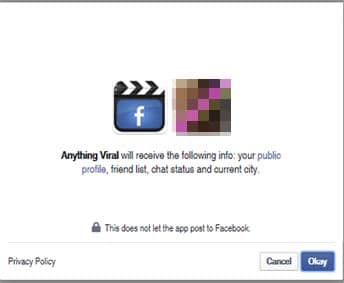4 types of Facebook friend who can put you at risk
Facebook users come in all shapes and sizes. Some barely post at all. Some post everything from their daily calorie intake to their detailed thoughts on the latest episode of Game of Thones.
Some Facebook users share interesting, inspiring and thought-provoking content from across the Web. Some post pictures of cats playing piano.
And some know what they’re doing. And some do not.
They say that a chain is only as strong as its weakest link. Using the same logic, we can say that your Facebook privacy/security is only as strong as your most uninformed Facebook friend.
Here we list 4 popular types of friends that can potentially put you at risk too…
The “let’s go in for every competition ever” friend
We all occasionally enter the odd competition now and again. But the problem with competitions or giveaways on Facebook is that a lot of them are scams.
We discuss Facebook competition scams on our blog post here, as well as how they work. But briefly, they’re those posts that spread across Facebook that ask you to like and share them to all your Facebook friends. Quite often they also ask you to visit another webpage and complete surveys and questionnaires.
These are scams, after your personal information, which they use to spam you. Facebook users can also be targeted by more serious scammers once they fall for these fake competitions.
Facebook users who often fall for these scams put their friends at risk because they’re always sharing the scammy competition links on their Facebook timelines as is always the pre-requisite with this type of online fraud.
This particular friend comes in various other guises as well. They can also be known as the “let’s try and look at every curious clickbait video that comes our way” friend, too.
The answer – make sure your friends know how to spot a fake Facebook competition, or for that matter, any type of Facebook spam that forces you to share spammy links across Facebook.
Sponsored Content. Continued below...
The “everything I post is public” friend
It’s the online equivalent to naturism. The friend who bears all with no shame, proudly exhibiting themselves to anyone who cares to look.
Some people on Facebook just really don’t get privacy. Perhaps the most basic privacy setting on the world’s largest social networking website is the one that controls who can see the status updates and photos you upload onto Facebook.
If one of your friends has set this option to public (it really, really shouldn’t be public) then everything they post can be seen by anyone – even if it’s a photo they upload of you. Even if it’s a status where you’re “checked in” or tagged in.
Even if you comment on anything they upload or post, that comment too is shown to the public.
This is a privacy nightmare. It can lead to embarrassing situations after a public photo turns up on Facebook showing you to be somewhere you shouldn’t be. Or this information could even be accumulated by identity thieves or other types of criminal who scour Facebook looking for these privacy lacking Facebook profiles.
The answer – make sure your friends know how to lock down their Facebook account.
The “I’m blatantly going to fall for a phishing scam” friend
Also known as the “I’m blatantly going to get a malware infection” friend.
The most common way a criminal accesses the account belonging to someone else is by getting their hands on the password, and this in turn is done via a phishing scam (either that or malware can do the job too.)
Phishing scams are those scams that lead you to a site that looks like Facebook but isn’t. It asks a user to enter their username and password and lo ‘n behold, the password is sent straight to a scammer.
Once the victim’s account is accessed, the victim’s friends may very well become the next target, and there are a number of scams that could be initiated at this point.
Identity thieves could crawl friend’s profiles looking for personal information. The classic “friend in crisis” scam could be initiated where the scammer asks for money from the friends of the victim, all the while pretending to be the victim.
Or the account can be used to send more phishing scams out to the victim’s friends. A popular example of this is changing the name of the account to something like “Facebook Security” and then direct messaging the friends a spoof phishing link.
The answer – educate your friends on Facebook phishing scams. Also make sure they have login approvals enabled.
The “I’m willing to install pretty much any Facebook app” friend
The Facebook App platform represents a pretty vulnerable side to the Facebook website. And that is because anyone with programming experience can develop an App, and they are often designed to lure Facebook users into cyber-traps.
Any friend who shows no inhibitions as to what type of App they’re willing to install represents a security risk to you. This is because Facebook Apps can harness certain powers over a Facebook account – for example it can share dangerous links from that friends timeline, or it can even initiate a Chat message to you if given the correct permissions, and because it uses a Facebook friends account to do it, it may look like it came from them.
Take a look at the image below, for example, which is the result of a rogue Facebook App.
The answer – make sure your friends know to avoid installing untrusted Facebook Apps.
Do you have any of these friends on your Facebook friends list? Can you think of any other types of friends? Let us know.
Continued below...
Thanks for reading, we hope this article helped, but before you leave us for greener pastures, please help us out.
We're hoping to be totally ad-free by 2025 - after all, no one likes online adverts, and all they do is get in the way and slow everything down. But of course we still have fees and costs to pay, so please, please consider becoming a Facebook supporter! It costs only 0.99p (~$1.30) a month (you can stop at any time) and ensures we can still keep posting Cybersecurity themed content to help keep our communities safe and scam-free. You can subscribe here
Remember, we're active on social media - so follow us on Facebook, Bluesky, Instagram and X





![chat-spam[1]](https://www.thatsnonsense.com/wp-content/uploads/2015/04/chat-spam1.jpg)